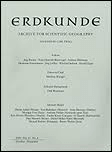
Erdkunde
Scope & Guideline
Illuminating Contemporary Trends in Geographic Research
Introduction
Aims and Scopes
- Urban Studies and Planning:
The journal frequently publishes research related to urban dynamics, including urbanization, gentrification, and the impacts of migration on urban habitats, emphasizing the interplay between social processes and spatial configurations. - Environmental Geography and Climate Studies:
Research on climate change, environmental impacts, and sustainability is a core focus, with studies often utilizing long-term ecological data to assess changes in ecosystems and human-environment interactions. - Cultural and Political Geography:
Erdkunde examines the socio-political dimensions of geography, including the role of cultural practices in shaping space, national identities, and the implications of globalization on local communities. - Methodological Innovations in Geography:
The journal promotes methodological advancements in geographical research, particularly in data collection and analysis techniques, including remote sensing and qualitative approaches. - Migration and Mobility Studies:
A significant area of research involves understanding migration patterns, their socio-economic effects, and the integration of migrants within urban and rural contexts.
Trending and Emerging
- Urban Resilience and Sustainability:
The journal is witnessing a surge in studies exploring urban resilience, particularly in the context of climate change adaptation and urban heat stress, highlighting the need for sustainable urban planning. - Digital and Remote Sensing Technologies:
There is a growing emphasis on the use of digital tools and remote sensing for geographical analysis, with papers focusing on applications in environmental monitoring and urban studies. - Health and Geography Post-COVID-19:
Research exploring the geographical implications of the COVID-19 pandemic, including health disparities and urban responses to crises, has become increasingly significant. - Socio-Environmental Justice:
Emerging themes around socio-environmental justice and the impacts of migration on local communities are gaining traction, reflecting broader societal concerns regarding equity and access. - Cultural Geography and Identity Politics:
The exploration of cultural narratives, identity politics, and their spatial manifestations is becoming more prominent, as researchers seek to understand the complexities of social geographies.
Declining or Waning
- Traditional Land Use Studies:
Research focused on conventional land use practices has become less prominent, as the journal increasingly emphasizes contemporary issues such as urbanization and globalization. - Historical Geography:
Papers dedicated solely to historical analyses of geographical phenomena have diminished, indicating a trend toward more current and applied geographical research. - Regional Studies with Limited Scope:
Studies that concentrate narrowly on specific regional phenomena without broader implications or connections to global trends appear to be decreasing in frequency. - Purely Theoretical Geography:
There has been a notable reduction in papers that focus exclusively on theoretical frameworks without empirical application, as the journal seeks to enhance practical relevance. - Geographical Education:
Research related to geographical pedagogy and education has seen a waning interest, possibly due to a shift towards more applied geographical research and professional practice.
Similar Journals

Biblio 3W-Barcelona
Exploring the future of bibliographic studies.Biblio 3W-Barcelona is a prominent academic journal published by the Universitat de Barcelona, Servei Publicacions, focusing on the dynamic field of library and information science. Established to foster scholarly communication, this journal provides a platform for researchers, professionals, and students dedicated to the advancement of bibliographic studies and library management. Despite lacking a current impact factor, Biblio 3W-Barcelona is recognized for its commitment to high-quality research and its contribution to the field, making it a valuable resource for those engaged in understanding the complexities of information dissemination in modern society. The journal features original research articles, critical reviews, and case studies that invite varied perspectives within the realm of librarianship. Readers can access its comprehensive body of work freely, enriching their knowledge and fostering practical applications in library science. For submission guidelines and further information, visit their website.

Miscellanea Geographica
Navigating the Landscape of Scholarly DiscoveryMiscellanea Geographica, published by SCIENDO, is a prominent open-access journal established in Germany that contributes significantly to the fields of Earth and Planetary Sciences and Geography. With an ISSN of 0867-6046 and an E-ISSN of 2084-6118, this journal has been a platform for scholarly dissemination since 1984, encompassing a diverse range of interdisciplinary research areas. Since transitioning to open access in 2011, it has made its content widely available, enhancing visibility for researchers and practitioners across the globe. In the 2023 category quartiles, Miscellanea Geographica is ranked Q3 in both Earth and Planetary Sciences (miscellaneous) and Geography, Planning and Development, reflecting its commitment to quality scholarship. This journal is specifically designed to foster dialogue and collaboration among researchers, professionals, and students, making it a vital resource for those invested in the intricate relationships between geography and societal development. Researchers are encouraged to contribute groundbreaking studies that not only advance academic understanding but also address real-world challenges.
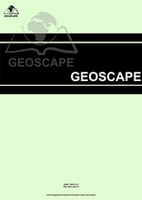
GeoScape
Advancing knowledge for a sustainable future.GeoScape is a distinguished open-access journal published by SCIENDO, operating since 2006 and aimed at fostering knowledge in the fields of Ecology, Geography, Urban Studies, and Nature and Landscape Conservation. Based in Warsaw, Poland, the journal maintains a robust academic presence with an impact factor reflective of its quality, prominently positioned in the Q3 category for multiple significant subject areas as of 2023. With its commitment to disseminating high-quality research, GeoScape holds notable Scopus rankings, including a rank of #94 in Urban Studies and #213 in Ecology, signifying its contribution to environmental science discussions. The journal serves as an essential resource for researchers, professionals, and students seeking to advance their understanding of contemporary ecological challenges and urban development in an accessible format.

Hungarian Geographical Bulletin
Exploring the intersections of geography, culture, and agronomy.Hungarian Geographical Bulletin, with ISSN 2064-5031 and E-ISSN 2064-5147, is a premier open-access journal published by the CSFK GEOGRAPHICAL INSTITUTE that has been an influential resource since 2009, dedicated to advancing the fields of geography, cultural studies, and agronomy. Located in Budapest, Hungary, this journal aims to disseminate high-quality research and engage a diverse audience of researchers, professionals, and students. The journal's reputation is underscored by its impressive category quartiles in 2023, ranking Q2 in Agronomy and Crop Science, Q1 in Cultural Studies, and Q2 across several other areas, including Geography and Earth and Planetary Sciences. With a Scopus ranking that places it in the top percentiles in multiple fields, the Hungarian Geographical Bulletin serves as an essential platform for innovative ideas and discussions that drive geographical scholarship and practice forward, specifically during its converged years from 2014 to 2024. Whether you are a seasoned researcher or an enthusiastic student, this journal presents a wealth of knowledge that is easily accessible due to its open-access format.

Boletin Goiano de Geografia
Navigating the Intersection of Geography and SocietyBoletin Goiano de Geografia is a distinguished academic journal dedicated to the field of Geography, published by the Universidade Federal de Goiás, Instituto de Estudos Socio-Ambientais. Since its inception in 1981, this Open Access journal has provided invaluable insights into the geographical dynamics of Brazil and beyond, promoting scholarly research and dialogue among geographers, environmentalists, and social scientists. The journal seeks to advance knowledge through the dissemination of research articles, reviews, and case studies that address contemporary issues in human and physical geography. With a commitment to fostering interdisciplinary collaboration, Boletin Goiano de Geografia serves as a vital resource for researchers, professionals, and students seeking to explore the complex interactions between society and the environment. Situated in the vibrant academic landscape of Goiana, Brazil, this journal enhances the global discourse on geographical studies and sustainability.
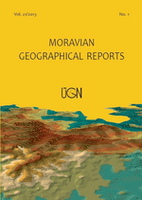
Moravian Geographical Reports
Connecting Geographical Insights with Global ImpactWelcome to the Moravian Geographical Reports, an esteemed Open Access journal published by SCIENDO, dedicated to advancing the fields of Earth and Planetary Sciences as well as Geography, Planning and Development. Established in 1993, this journal has steadily built a reputation for disseminating high-quality research, evidenced by its 2023 Q2 ranking in both relevant categories and an impressive Scopus percentile ranking of 72. With a dedicated editorial board and an expanding global readership, the Moravian Geographical Reports serves as a vital platform for researchers, professionals, and students alike, fostering dialogue and collaboration across various dimensions of geographical and environmental studies. Since its shift to Open Access in 2013, it has significantly enhanced the accessibility and reach of its published works, making crucial research findings available to a broader audience. The journal continues to thrive as a significant contributor to the geographical and earth sciences discourse during its converged years from 1993 to 2024.
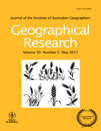
Geographical Research
Fostering Dialogue in Geography and PlanningGeographical Research, published by WILEY, is a premier academic journal based in the United Kingdom, dedicated to advancing knowledge in the fields of Geography, Planning, and Earth-Surface Processes. With an impact factor that reflects its high academic caliber, this journal ranks in the Q2 category for Earth-Surface Processes and Q1 in Geography, Planning and Development, highlighting its influential role in shaping contemporary research within these disciplines. The journal's Scopus rankings further underscore its significance, standing at #175 out of 821 in Geography, and #41 out of 179 in Earth-Surface Processes, placing it within the top 78th and 77th percentiles, respectively. Since its inception in 2005, Geographical Research has continuously provided a vital platform for scholars to disseminate innovative research, fostering dialogue and collaboration across disciplines. Although currently not open access, its content remains indispensable for researchers, professionals, and students aiming to deepen their understanding of geographical phenomena and develop strategic insights for planning and development.

GEOGRAFICKY CASOPIS-Geographical Journal
Unveiling the complexities of our planet, one study at a time.GEOGRAFICKY CASOPIS-Geographical Journal is a prestigious publication dedicated to advancing knowledge in the fields of geography and earth sciences, published by the SLOVAK ACADEMY OF SCIENCES, INSTITUTE OF GEOGRAPHY. With a rich history dating back to its inception in 1976, the journal serves as a vital forum for researchers and professionals to disseminate their findings across a range of topics including earth-surface processes, geography, planning, development, and geology. Notably, it maintains a respectable Q3 category ranking across these disciplines as of 2023, indicating its contribution to relevant academic discourse. The journal is indexed under critical databases and engages a global audience, making it an essential resource for scholars seeking to stay informed about contemporary issues and advancements in geography. Although currently not an open-access journal, it emphasizes the sharing of significant research findings and encourages submissions from various geographical contexts to enrich the scientific community. Geographical Journal's commitment to fostering interdisciplinary dialogue ensures its relevance and importance in shaping the future of geographical research.
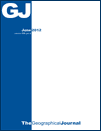
GEOGRAPHICAL JOURNAL
Connecting theory and application in the realm of geography.Geographical Journal, published by Wiley, is a leading scholarly resource dedicated to advancing the field of geography and earth-surface processes. With an established history dating back to 1973, this prestigious journal thrives on disseminating high-quality research, featuring a robust archive that encompasses critical insights from various geographical and environmental studies. As evidenced by its impressive Q1 rankings in both Earth-Surface Processes and Geography, Planning and Development, the journal stands out in its commitment to impact and relevance in the academic community. Although not Open Access, the journal provides researchers, professionals, and students with invaluable peer-reviewed articles essential for understanding complex geographical phenomena. Whether you are focused on socio-environmental interactions or earth sustainability, Geographical Journal serves as a cornerstone for innovative research, fostering knowledge that shapes policy and practice.

TIJDSCHRIFT VOOR ECONOMISCHE EN SOCIALE GEOGRAFIE
Exploring the Nexus of Economics and Social GeographyTIJDSCHRIFT VOOR ECONOMISCHE EN SOCIALE GEOGRAFIE, an esteemed journal published by WILEY, provides a premier platform for the dissemination of cutting-edge research within the fields of economics and social geography. With an ISSN of 0040-747X and an E-ISSN of 1467-9663, this journal has established itself as a pivotal resource, exhibiting a remarkable Q1 ranking in both Economics and Econometrics as well as Geography, Planning and Development for 2023. Notably, it is positioned in the 95th percentile among 821 journals in its category of Social Sciences, and ranks 46th among 716 in Economics and Econometrics, underscoring its influential role in shaping academic discourse. The journal, which has been in publication since 1967 and is anticipated to run through 2024, invites contributions that explore the intricate interplay between economic phenomena and social geospatial dynamics. Researchers, professionals, and students are encouraged to engage with its findings, which are crucial for understanding contemporary socio-economic challenges and innovations on a global scale.